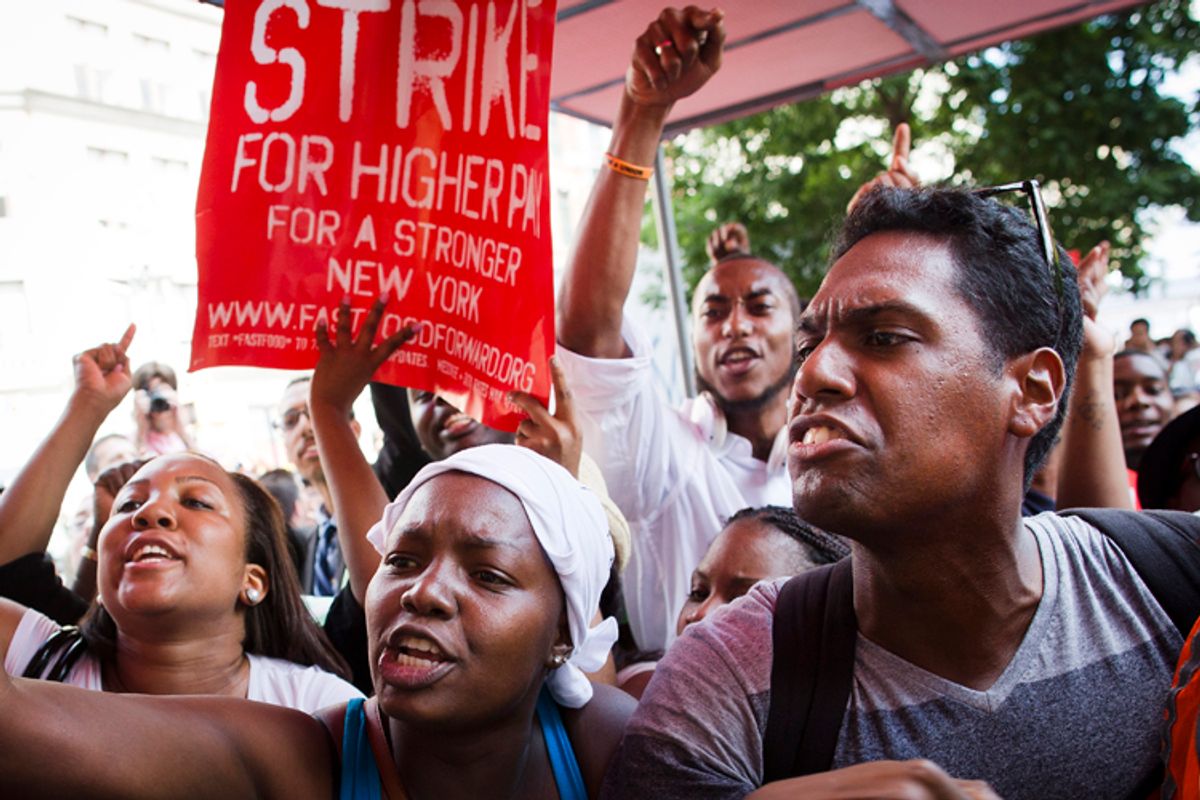Twin studies released at noon Tuesday estimate that the majority of families of front-line fast food workers use public assistance, at a taxpayer cost of nearly $7 billion a year, while seven publicly-traded fast food corporations made $7.4 billion in profit last year.
The first study finds that 52 percent of families of workers employed at least 27 weeks a year and 10 hours a week in rank-and-file fast food jobs are enrolled in Medicaid, the Children’s Health Insurance Program, food stamps, the Federal Earned Income Tax Credit, or Temporary Assistance for Needy Families (the program that replaced Aid to Families with Dependent Children under “welfare reform”). That includes a majority of those workers who are employed at least 40 hours week. The study, "Fast Food, Poverty Wages," was sponsored by the UC Berkeley Center for Labor Research and Education and the University of Illinois at Urbana-Champaign Department of Urban & Regional Planning, and funded by the labor group Fast Food Forward. The estimates were based on government data.
A second study, by the pro-union National Employment Law Project, extended the analysis to individual companies, estimating that McDonald’s workers received $1.2 billion in public assistance while the corporation netted $5.5 billion in Fiscal Year 2012 profits, and devoted $5.5 billion to dividends and stock buybacks.
“This is the public cost of low-wage jobs in America,” write the authors of the Berkeley–Urbana-Champaign study. “The cost is public because taxpayers bear it. Yet it remains hidden in national policy debates about poverty, employment and federal spending.”
A spokesperson for McDonald’s declined last night to comment on the fast food campaign or the extent of fast food workers’ use of public assistance. A spokesperson for the fast food giant emailed in August that “Our history is full of examples who worked their first job with McDonald’s and went on to successful careers both within and outside of McDonald’s.” The National Restaurant Association did not immediately respond to a Monday afternoon inquiry.
As Salon first reported, New York City fast food workers mounted an unprecedented strike last November, the first in a wave of work stoppages around the country that included a 60-city walkout in August – each demanding a raise of $15 an hour and the chance to unionize without intimidation. Little Caesar’s worker Julio Wilson said before walking off the job that he’d “made my way through the fast food circuit,” with stints at Burger King, Subway, Arby’s and McDonald’s, “and they’re all the same.” He told Salon that many fellow employees and their families “need to be compensated to be able to live.”
Funding today’s university report represents the fast food campaign’s latest salvo against the growing, increasingly representative and virtually union-free fast food industry. The key player behind the national campaign has been the Service Employees International Union. Along with a series of one-day strikes, organizers have targeted fast food companies with media, political, and consumer pressure. SEIU strategist Scott Courtney told Salon in August that given the disparity between McDonald’s profits and workers’ poverty, “the story is leverage in and of itself.”
Writing in defense of Wal-Mart in Slate in 2006, Jason Furman, who now chairs the White House's Council of Economic Advisors, criticized critics who, like fast food activists, had cited hefty public assistance tolls in making their case. “As far as I can tell,” wrote Furman, “these are cynical attempts to expand the appeal of the case against Wal-Mart, moving it beyond an appeal to the atavistic anti-corporate instincts of some progressives by playing on the atavistic anti-welfare, anti-government, anti-tax instincts of some conservatives.”
The authors of the Berkeley–Urbana-Champaign study call the public assistance programs whose costs they tally “indispensable,” saying they “provide a last line of defense between America’s growing low-income workforce and the want of basic necessities.” But they suggest that such programs “would be more effective if they were combined with measures to improve wages and health benefits among low-wage workers,” such as increasing the minimum wage, passing “local laws to raise labor standards” or facilitating union collective bargaining. Noting the difficulty of offshoring a fast food job, the scholars write, “Rather than reflecting the competitive dictates of global product markets, the low-wage structure of fast-food and other domestic service industries reflects a mixture of market conditions and policy choices about minimum standards for work.”

Shares